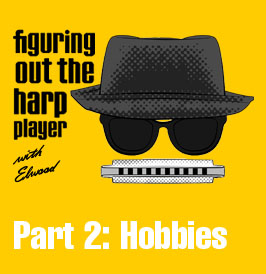The Little Walter Diary Ch.2 – Sad Hours
 Round about five
Round about five
Having openly declared my personal shortcomings apropos studying Walter Minor, there’s no escaping his genius. And the guy continues to toss pebbles at the window of my blues garret. The latest wake up call was a request to decode the start of Sad Hours. The outcome? Unexpected exposure to an architectural masterpiece. I was left standing in my pyjamas, rubbing my eyes, wondering what hit me.
It’s a given that mastery of Little Walter’s diatonic dialect is an essential step in any blues harp player’s development. Ever contrary by nature, I therefore embarked on a love affair with Big Walter. Latterly however, I have come to accept my latent appreciation of Marion Walters Jacobs and to indulge in the occasional flirtation. Sad Hours certainly gets the blues fuse smouldering. It was Walter’s 1952 follow up to Juke and it made No.2 on the Billboard R&B Chart. (more…)


